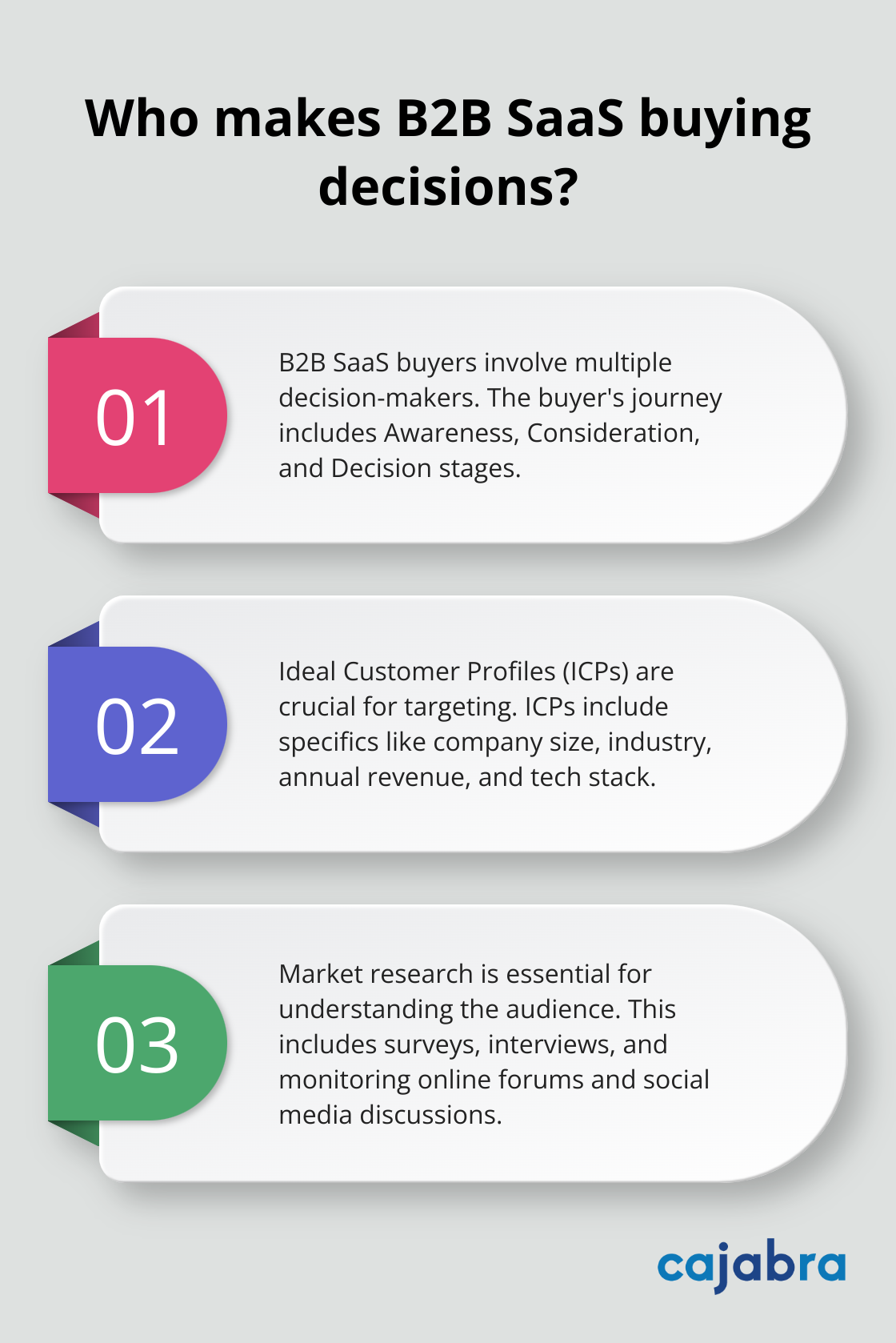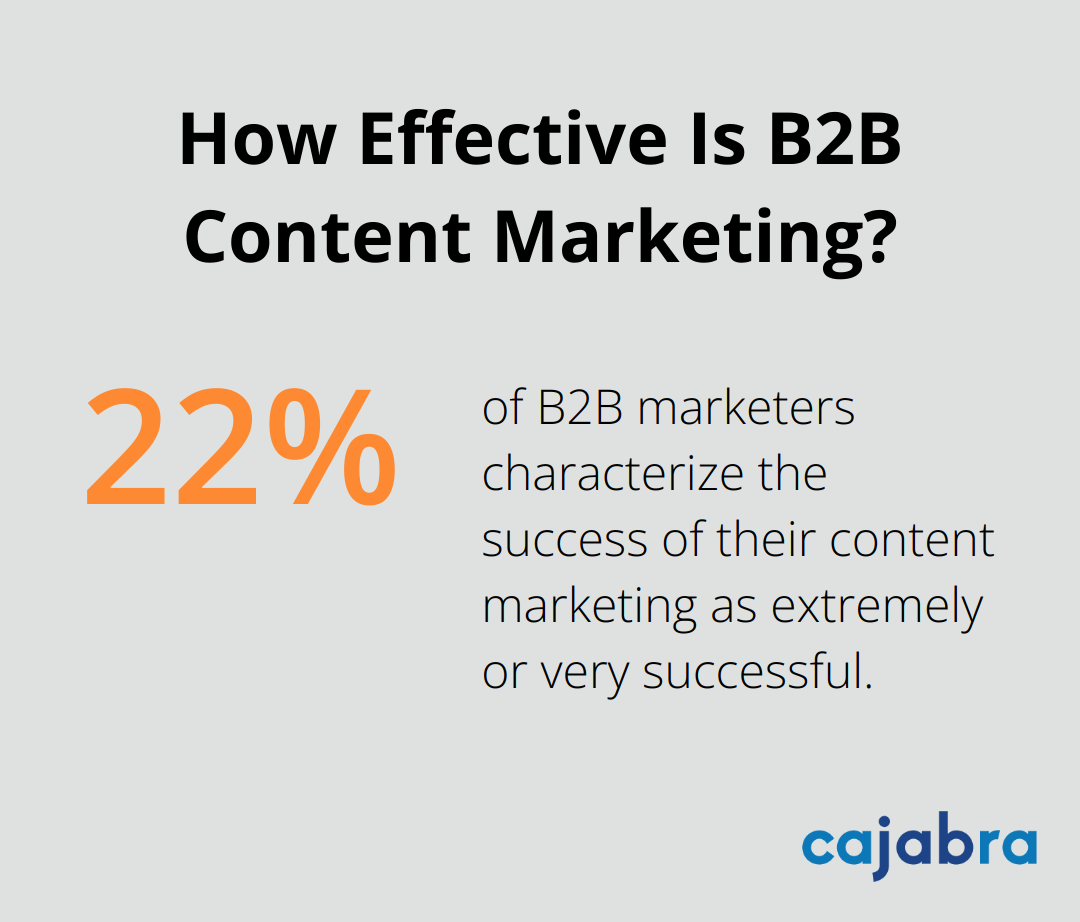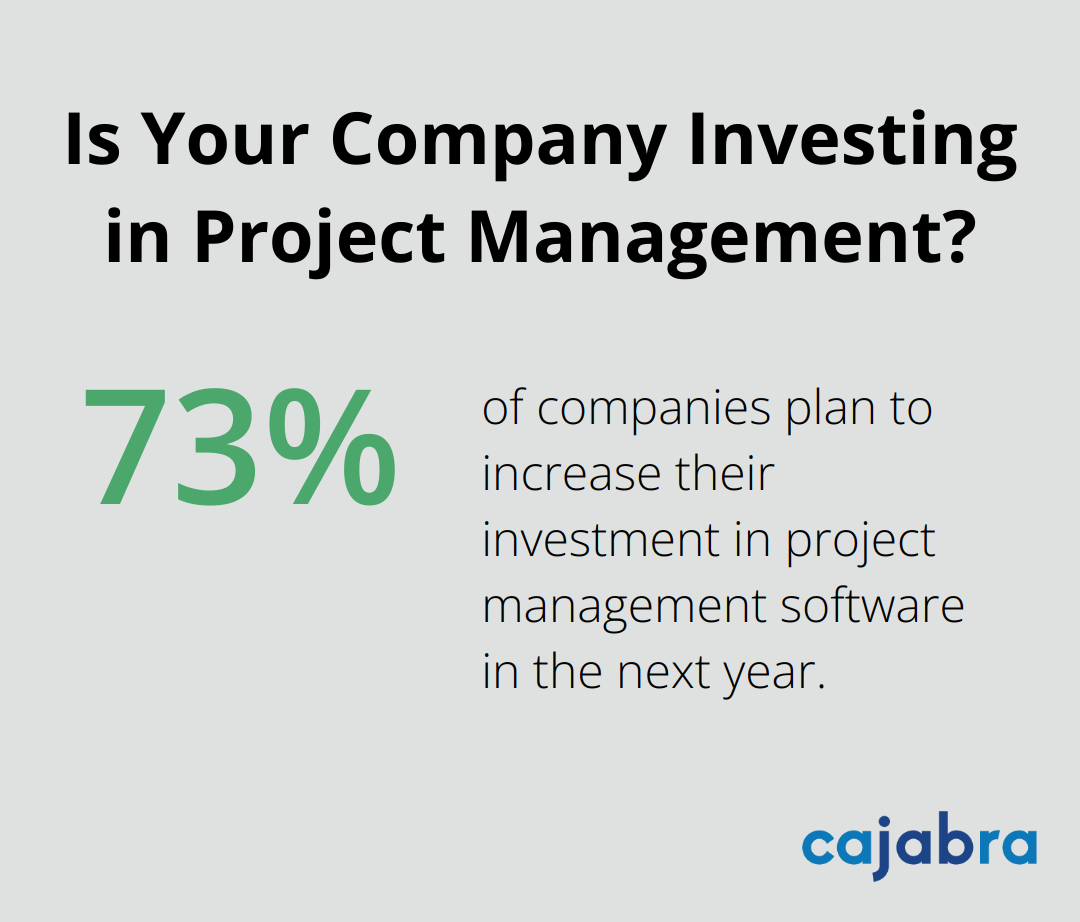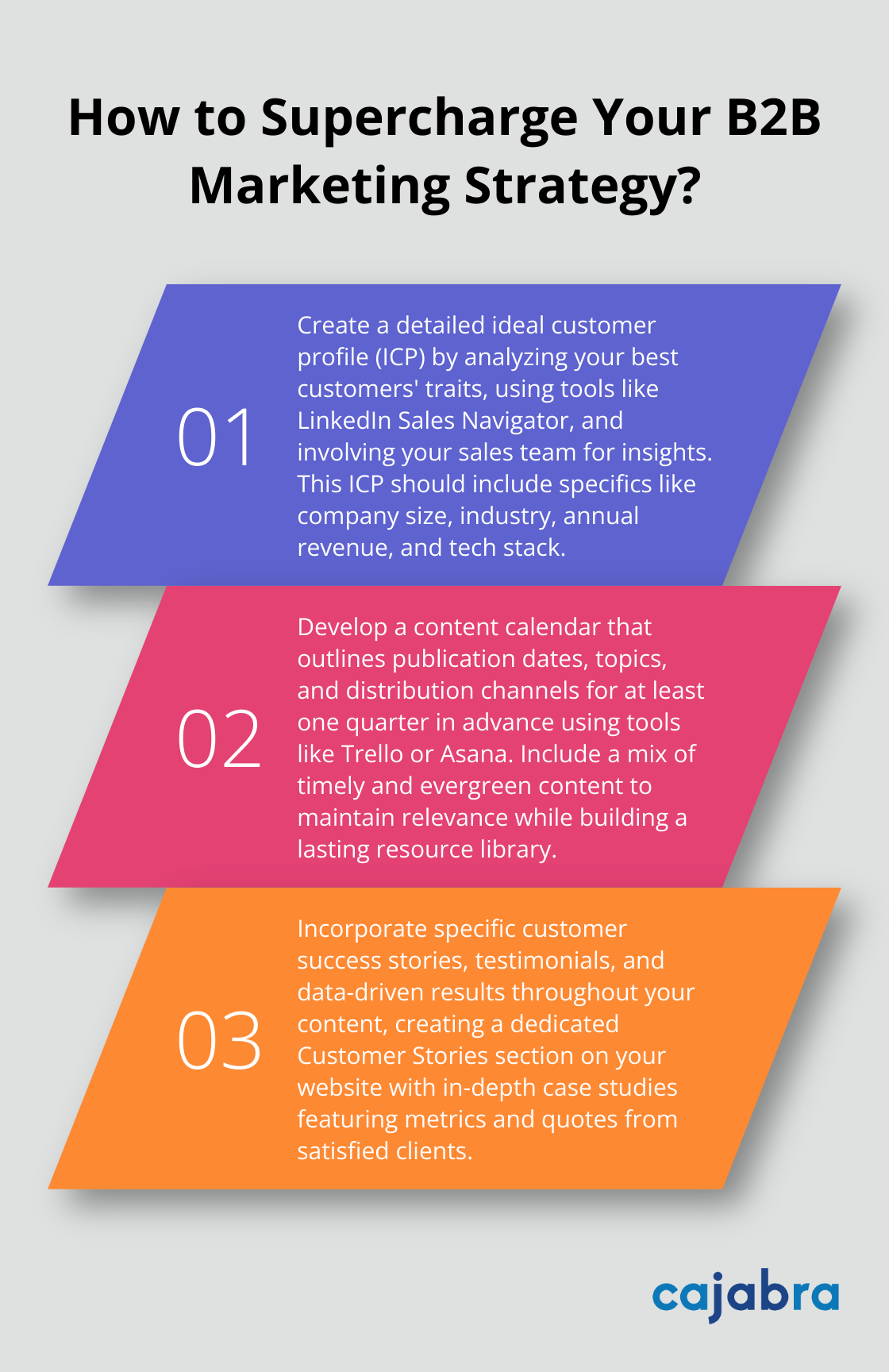
B2B SaaS content marketing can be a game-changer for your business growth. At Cajabra, LLC, we've seen firsthand how a well-crafted strategy can drive leads, conversions, and customer loyalty.
In this post, we'll share our proven approach to creating a winning B2B SaaS content marketing strategy. From understanding your audience to crafting compelling content, we'll cover all the essential steps to help you succeed in the competitive SaaS landscape.
The foundation of a successful B2B SaaS content marketing strategy lies in understanding your audience. Start by creating a detailed ideal customer profile (ICP). This profile should include specifics like company size, industry, annual revenue, and tech stack. For instance, if you sell accounting software, your ICP might target mid-sized manufacturing firms with $10-50 million in annual revenue using outdated financial systems.

To build your ICP, analyze your current best customers and identify their shared traits. Use tools like LinkedIn Sales Navigator to research similar companies. Involve your sales team in this process, as they often possess valuable insights into customer characteristics.
Once you establish your ICP, conduct comprehensive market research. This research should extend beyond reading industry reports to hands-on engagement with potential customers.
Create surveys using tools like SurveyMonkey or Typeform. Ask about pain points, goals, and decision-making processes. (Today's B2B buyers are more prepared than ever, but this preparation doesn't necessarily translate into better decisions.)
Schedule interviews with current clients or prospects. These one-on-one conversations often reveal nuances that surveys might miss. Ask open-ended questions about their challenges and how they evaluate solutions.
Monitor online forums and social media discussions where your target audience congregates. Tools like Hootsuite can help track relevant conversations across platforms.
Understanding your audience requires knowledge of their journey from awareness to purchase. For B2B SaaS, this journey often involves multiple decision-makers and complex processes.
Identify the key stages: Awareness, Consideration, and Decision. Then, map out the specific steps your potential customers take at each stage. Determine what information they need and which channels they use.
For example, during the Awareness stage, a CFO might read blog posts about improving financial processes. In the Consideration stage, they might download whitepapers comparing different software solutions. Finally, in the Decision stage, they're likely to request product demos or free trials.
Use tools like Google Analytics to track how users move through your website. This data can reveal patterns in their research and decision-making process.
The B2B SaaS buyer's journey isn't always linear. Your content strategy must address this reality.
As you move forward in developing your content strategy, keep these audience insights at the forefront. They will guide your decisions on content types, topics, and distribution channels, ensuring your efforts resonate with your target market.
A well-structured content strategy starts with specific, measurable goals. Define what you want to achieve: increased website traffic, more leads, or improved customer retention. Assign Key Performance Indicators (KPIs) to each goal. For lead generation, track conversion rates, form submissions, and qualified leads generated.
22% of B2B marketers characterize the success of their content marketing as extremely or very successful. Write down your goals and KPIs, then share them with your team for alignment and accountability.
B2B SaaS requires specific content formats. Here are high-performing options:
B2B buyers crave concise, research-based content to inform the purchasing process. Create content for each stage of the buyer's journey to meet this demand.
Consistency drives content marketing success. Create a content calendar that outlines publication dates, topics, and distribution channels. Tools like Trello or Asana can streamline this process.

Plan content at least one quarter in advance. This approach allows time for thorough research, creation, and review. Include a mix of timely and evergreen content to maintain relevance while building a lasting resource library.
Search Engine Optimization (SEO) plays a vital role in B2B SaaS content marketing. Implement these actionable tips:
An Ahrefs study found that the average top-ranking page is over two years old. This fact highlights the importance of creating evergreen content and updating existing pieces regularly.
Your content strategy should remain flexible. Monitor KPIs consistently and adjust your approach based on performance metrics. The B2B SaaS landscape changes rapidly, and your content strategy must adapt to stay relevant and effective.
As you move forward with your content strategy, the next step involves crafting compelling B2B SaaS content that resonates with your audience and drives results.
The most effective B2B SaaS content directly tackles the challenges potential customers face. List the top 5-10 pain points your product solves. For each pain point, create a piece of content that acknowledges the problem and offers practical solutions.

For example, if you sell project management software, write an article titled "5 Ways to Eliminate Missed Deadlines in Your Team." This approach immediately resonates with project managers who struggle with timeline issues.
While addressing pain points is important, it's equally crucial to highlight how your SaaS solution stands out from the competition. Focus on your unique features and the specific benefits they bring to users.
Don't simply list features. Create content that demonstrates the real-world impact of your product. A case study titled "How Company X Increased Productivity by 35% Using Our Software" is far more compelling than a generic feature list.
In the B2B SaaS world, trust is everything. Incorporate customer success stories, testimonials, and data-driven results throughout your content. A study by TrustRadius found that self-service is now non-negotiable for B2B buyers. This means your content needs to build trust without direct sales intervention.
Create a dedicated "Customer Stories" section on your website, featuring in-depth case studies. Include specific metrics and quotes from satisfied clients. "We saved $50,000 in the first year after implementing this solution," carries much more weight than a generic "It's a great product."
Incorporate relevant data and industry trends into your content to establish authority and provide value to your readers. This approach shows that you understand the market and can offer insights beyond your product features.
Try to include at least one relevant statistic or data point in each piece of content you create. For example, "According to a recent industry report, 73% of companies plan to increase their investment in project management software in the next year."
When crafting your content, always keep the end goal in mind: driving conversions. Every piece should guide the reader towards taking the next step, whether that's signing up for a free trial, requesting a demo, or contacting your sales team.
Use clear and compelling calls-to-action (CTAs) throughout your content. Place these CTAs strategically (at the end of sections, in sidebars, or as pop-ups) to maximize their effectiveness without being intrusive.
A successful B2B SaaS content marketing strategy requires a deep understanding of your audience and the creation of compelling content that drives conversions. We set clear goals, choose appropriate content types, and implement a consistent content calendar to develop an effective strategy. Our approach focuses on addressing pain points, showcasing unique value propositions, and leveraging social proof to build trust and credibility.

A B2B SaaS content marketing strategy must adapt to the evolving landscape. We monitor KPIs, analyze results, and adjust our approach based on what works best for our audience. Our team stays informed about industry trends and prepares to pivot strategies as needed (this flexibility ensures long-term success).
At Cajabra, we help accounting firms implement effective marketing strategies that drive results. Our JAB System™ and Premium Online Presence Package can help create a strong brand identity and generate high-quality leads. Visit our website to learn more about how we can support your growth journey.



